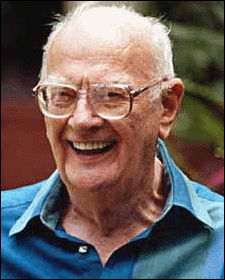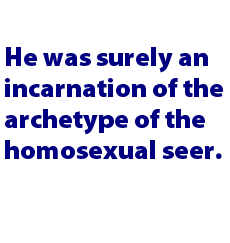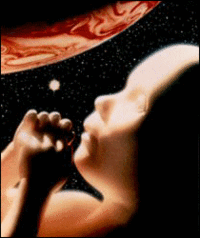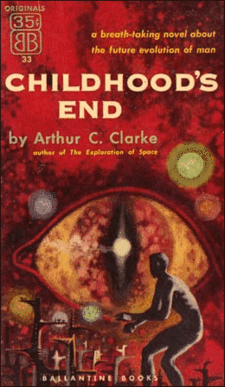By Toby Johnson
 March 18, 2008, at the age of 90, renowned writer and futurologist Arthur C. Clarke passed away. His death made national news in America—of course. His name, arguably, has been one of the most
March 18, 2008, at the age of 90, renowned writer and futurologist Arthur C. Clarke passed away. His death made national news in America—of course. His name, arguably, has been one of the most  recognizable in the world, if only as creator (with Stanley Kubrick) of the movie 2001: A Space Odyssey. He was a leader in consciousness evolution, an expert on space science, and author of over a hundred books.
recognizable in the world, if only as creator (with Stanley Kubrick) of the movie 2001: A Space Odyssey. He was a leader in consciousness evolution, an expert on space science, and author of over a hundred books.
What won’t be mentioned in most of the news stories, though, is that he was Gay. Of course, that’s using the term inaccurately. He wasn’t a Gay man like the post-Stonewall generation in the U.S., but he was certainly one of us.
Speaking personally, let me report that Clarke had a tremendous influence on me as a young man. I read all his books, emulated his writing style, and even to some extent adopted his post-religious “spiritual” vision of human consciousness. So in the late 1990s, when I learned my friend Kerry O’Quinn, a Gay Austinite and also a science fiction writer, told me he’d met Clarke and carried on a correspondence with him, I jumped at the opportunity to be introduced by mail. I corresponded with Clarke for several years. I wrote about his post-religious spirituality in a couple of my books and cleared my acknowledgement of his sexual identity with him. So I have no qualms  about my including him in the pantheon of homosexual seers.
about my including him in the pantheon of homosexual seers.
An ex-patriate Englishman, Clarke lived most of his adult life as what English society might call a “confirmed bachelor” in an intentional, extended family in the Theravada Buddhist land of Sri Lanka (in fable, the mystical island of Serendip where good fortune and lucky coincidence reign). Though married for a time as a young man, Clarke offered a marvelous example of the contributing, participating life, lived free of the conventions of marriage and childrearing.
He demurred about coming out publicly as Gay, he wrote, because he felt this fact would be used to discredit his ideas. He was 61 at the time of Stonewall, already past the sexual prime in which it’s meaningful to identify oneself as Gay. And, indeed, in 1997, a British tabloid, The Sunday Mirror, ran a story accusing him of having moved to Sri Lanka in order to buy sex from underaged boys, something he found offensive and the accusation distressing. He thought the accusation was really aimed at Prince Charles who was scheduled to knight him—as Sir Arthur—that same year. (At the same time as Sir Elton John, by the way.)
 He had a cute quip about not being Gay: "At my age now,” he said, “I’m just a little bit cheerful." He wrote that he was quite fascinated with the role homosexuals have played down through time as revolutionary thinkers. (In our correspondence, he expressed great interest in C.A. Tripp’s book about Abraham Lincoln as Gay.) He kept a private collection of writing which is not to be published until 50 years after his death. I’d wager the world is going to receive the open acknowledgement of his homosexuality and of his theory about gay consciousness as revolutionary come 2058.
He had a cute quip about not being Gay: "At my age now,” he said, “I’m just a little bit cheerful." He wrote that he was quite fascinated with the role homosexuals have played down through time as revolutionary thinkers. (In our correspondence, he expressed great interest in C.A. Tripp’s book about Abraham Lincoln as Gay.) He kept a private collection of writing which is not to be published until 50 years after his death. I’d wager the world is going to receive the open acknowledgement of his homosexuality and of his theory about gay consciousness as revolutionary come 2058.
Science fiction is one of the ways in which the mythmaking function of human consciousness appears today. 2001, with its final psychedelic imagery and apotheosis of astronaut David Bowman into the Star Child, described human consciousness transcending individuality and merging into some sort of greater consciousness, all explained in scientific sounding terms.
In his renowned novel, Childhood’s End, as scientific prophet, Clarke described a planetary progression to a collective mind (in the novel called “the Overmind”) that is foreshadowed by “psychic powers”: telepathy, telekinesis, clairvoyance, and memory of collective, cosmic events. In that sense, one might say he hypothesized such paranormal powers, long elements of religion and mysticism, to be forerunners and hints at humankind’s future evolution.
Even in the 1950s, when Childhood’s End appeared, he called himself an “agnostic Buddhist,” so he probably didn’t believe in a personal afterlife. Still we might imagine that in his dying, Sir Arthur experienced rising into the Overmind.
In his modern/futuristic way, he has surely been a visionary and “Enlightened Being,” a scientifically-minded prophet who had foreseen, and helped bring about, the modern transformation of consciousness. He was surely an incarnation of the archetype of the homosexual seer.
Writer and multiple Lambda Literary Award-winner Toby Johnson was the second publisher of White Crane Journal. He lives in San Antonio, Texas and reviews books for White Crane magazine.
People in Sri Lanka say he routinely hired young teen boys to take care of him for his health reasons and also for sexual services. But he did not prey of these teens, he hired them with their parents’ understanding, and never forced them to do anything they didn’t want to do. So that is not pedofilia, it is just enjoy kinship with young teens. Heteros like Ghandi did this too, with young teen girls. So no problem here. right?